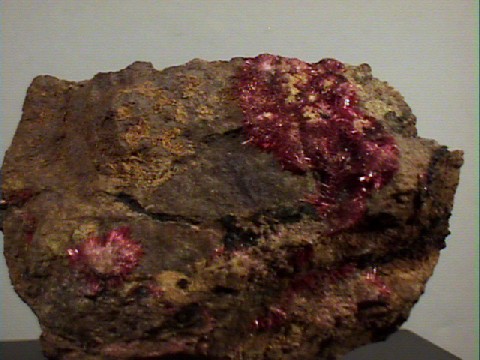
ERYTHRITE
Specimen ery-9
$ 30.00
Dims: 2.3 x 1.5 x 0.9" (5.8 x 3.8 x 2.4 cm)
Wt: 2.0 oz. (58 g)
San Bernado, Sonora, Mexico
This hand specimen consists of a few patches of tiny, radiating Erythrite needles that are spread out across one face of the base rock. These patches formed inside of cracks in the base rock and were exposed when it was freed. The crystals appear to be in good condition and do not exceed 2 mm in length. They are too fine to effectively study their monoclinic form, and show the classic red-violet color and a vitreous luster. All appear to be transparent and clear.
 Amethyst Galleries' Mineral Gallery MINERALS |
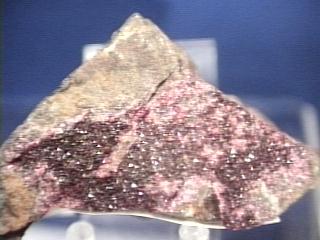
ERYTHRITE specimen ery-1
$ 45.00
$ 45.00
Dims: 3-1/2" x 2" x 1-1/4"
Wt: 5.7oz
Bou Azzer, Morocco
This rare cobalt mineral is relatively easy to recognize by its deep, violet-red color. Good crystal formation is not common on this mineral, and this specimen has only very small ones. It is however, a rare mineral, and will make an unusual and colorful addition to a collection.

ery-1 ($ 45.00)
Bou Azzer, Morocco
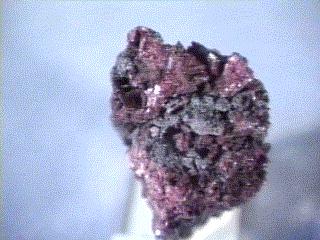
$ 48.00
Dims: 1-3/4" x 1-1/4" x 7/8"
Wt: 1.3 oz
Bou Azzer, Morocco
One of the better-quality erytherite specimens I've seen, this Moroccan beauty has noticeable damage in the form of crushed crystals, but most of them are intact, and a few are quite well-formed. They are platy and tabular, not raching more than 1/4 inch in diameter, and are clustered on a matrix of what is probably massive Cobaltite. This is common for such a specimen, but would someone please tell me how it can have a deposit of native copper in it? It's there, mostly hidden by the adhesive putty that holds the specimen to the stand.

Bou Azzer, Morocco
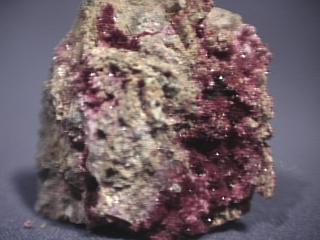
ERYTHRITE specimen ery-3
$ 40.00
$ 40.00
Dims: 2.0" x 2.0" x 1.1"(5.1 x 5.1 x 2.8 cm)
Wt: 2.50 oz.(70.9 g)
Alamos, Sonora, Mexico
This specimen is what comes to mind when I think of the nickname "cobalt bloom". It is partially covered with a "carpet" made up of hundreds of acicular, radiating Erythrite crystals. These crystals don't exceed 0.1"(3 mm) in length, but are easy to see, even without magnification. They are colored a dark violet-red, have a pearly to vitreous luster, and are translucent. Parts of this carpet show damage in the form of crushed crystals, but most of it is in excellent condition. The specimen has a few veins of the material running through it, and is rather delicate, so that care should be used when handling it. The host rock is flaky and definitely rust-colored. I really like the needle-like crystals- when one looks at them with a loupe or magnifier, it seems like a different world down there.
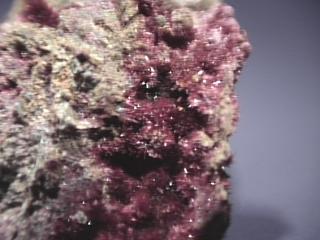

ery-3 ($ 40.00)
Alamos, Sonora, Mexico
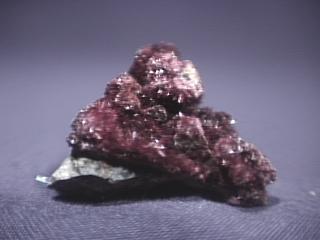
ERYTHRITE specimen ery-4
$ 30.00
$ 30.00
Dims: 1.5" x 1.2" x 0.8"(3.8 x 3.0 x 2.0 cm)
Wt: 15.9 g
Alamos, Sonora, Mexico
A small but excellent specimen, this piece is partially covered by a crust made up of hundreds of Erythrite crystals. They occur in a fibrous, radiating form that is commonly referred to as "cobalt bloom", as the puffy clusters resemble tiny, deep violet-red flowers. These crystals average about 0.1"(2-3 mm) in length, and are not much thicker than human hairs. They all have a pearly luster and are translucent. There is considerable damage to the crystals that rest on some nodules that rise above the host rock's surface, but most are intact. The underside of the host rock(which I believe may be made of quartzite) has a few heavily crushed clusters of Erythrite. This is quite a pretty little thumbnail specimen that is appropriate for the collector that needs to pay attention to available space.

ery-4 ($ 30.00)
Alamos, Sonora, Mexico
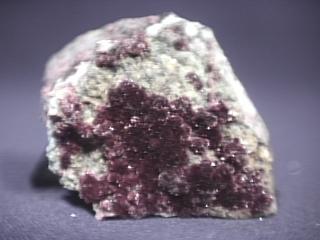
$ 85.00
Dims: 2.5" x 1.9" x 1.4"(6.4 x 4.8 x 3.6 cm)
Wt: 2.69 oz.(76.2 g)
Alamos, Sonora, Mexico
Many small, round clusters of acicular, radiating Erythrite crystals are gathered together on one face of the host rock of this specimen. They have the standard deep violet-red color, pearly luster, and translucence of the mineral, and their form is often referred to as "cobalt bloom", as the little radiating clusters resemble tiny flowers. None of these crystals exceed 0.1"(2 mm) in length. There appear to be only three or four of these little clusters that show any appreciable damage. They rest on a host rock of quartzite; the underside of this host rock shows patches of a bright metallic material that is probably skutterudite, a cobalt arsenide. A few thin veins of Erythrite also course through the host.
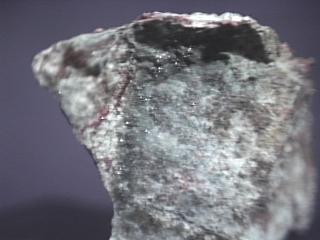

Alamos, Sonora, Mexico
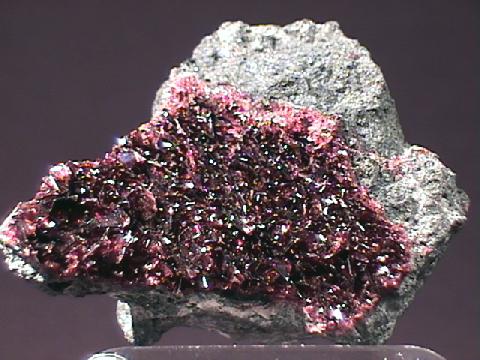
ERYTHRITE specimen ery-6
$ 95.00
$ 95.00
Dims: 2.3 x 2.0 x 1.5" (5.8 x 5.1 x 3.8 cm)
Wt: 4.4 oz. (125.8 g)
Bou Azzer, Morocco
Scores of beautiful monoclinic tabular Erythrite crystals are densely packed on one face of the host rock of this specimen. These crystals reach lengths of 0.3" (8 mm) and are in moderately good condition, as most of them appear to show minor damage to edges and tips. Their form is excellent, though, with sharp edges and clean faces that possess a bright pearly-to-vitreous luster. All have the red-violet coloration that is a characteristic of this mineral, and individual blades are transparent and quite clear, though their density makes it difficult to study most of them. The host rock on which they rest is gray and rough- I cannot determine what it is made of, but when I put a tiny drop of concentrated HCl on it, the liquid instantly turned green! There is a vein of feldspar running through it, however.
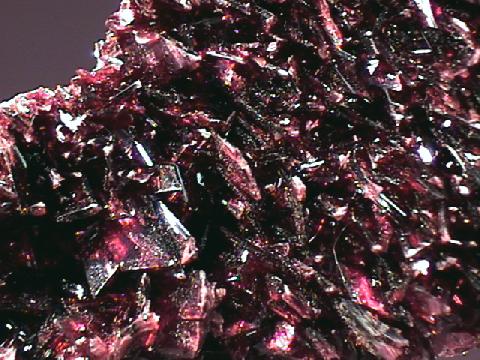

ery-6 ($ 95.00)
Bou Azzer, Morocco
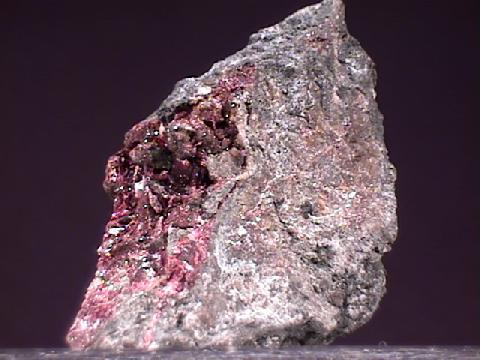
ERYTHRITE specimen ery-7
$ 25.00
$ 25.00
Dims: 2.4 x 1.6 x 1.0" (6.1 x 4.1 x 2.5 cm)
Wt: 2.05 oz. (58.2 g)
Bou Azzer, Morocco
Though most of the Erythrite blades on this specimen are damaged or broken, there are still a substantial number that are intact, though they tend to be sheltered in a rather deep crevice. They do not exceed 0.3 x 0.2 x 0.1" (8 x 5 x 2 mm) and show good monoclinic tabular form where intact, with sharp edges and smooth, clean faces that possess a pearly luster. They have the classic deep violet-red coloration that one expects of Erythrite, and one or two of the crystals that are exposed enough show dim transparence. I cannot identify the dull, gray host rock on which they rest, but HCl does turn green upon contact with it.
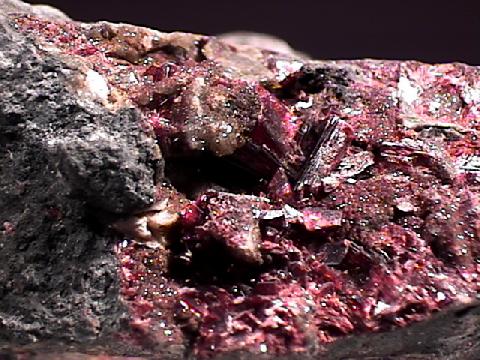

ery-7 ($ 25.00)
Bou Azzer, Morocco
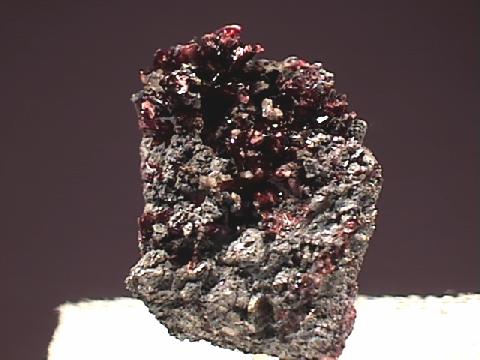
ERYTHRITE specimen ery-8
$ 40.00
$ 40.00
Dims: 1.0 x 0.6 x 0.2" (2.5 x 1.5 x 0.5 cm)
Wt: 13.1 g w/ specimen box
Bou Azzer, Morocco
Though quite small, this thumbnail specimen is made up mostly of Erythrite by weight. The Erythrite occurs in the form of small blades that are generally in fair condition, though most of their termination tips have been damaged. These crystals do not exceed 0.1" (3mm) along any dimension and show good monoclinic tabular form, with well-defined edges and clean faces that possess a pearly luster. They have the deep red-violet coloration that is very common for this mineral and are translucent or even transparent, though their small size makes this rather difficult to see. There is only a small amount of the very finely-grained gray host rock that acts as a base for the crystals, and several thin Erythrite veins run through it. The piece is set into a plastic specimen box for display and protection.

ery-8 ($ 40.00)
Bou Azzer, Morocco

ERYTHRITE specimen ery-9
$ 30.00
$ 30.00
Dims: 2.3 x 1.5 x 0.9" (5.8 x 3.8 x 2.4 cm)
Wt: 2.0 oz. (58 g)
San Bernado, Sonora, Mexico
This hand specimen consists of a few patches of tiny, radiating Erythrite needles that are spread out across one face of the base rock. These patches formed inside of cracks in the base rock and were exposed when it was freed. The crystals appear to be in good condition and do not exceed 2 mm in length. They are too fine to effectively study their monoclinic form, and show the classic red-violet color and a vitreous luster. All appear to be transparent and clear.

ery-9 ($ 30.00)
San Bernado, Sonora, Mexico
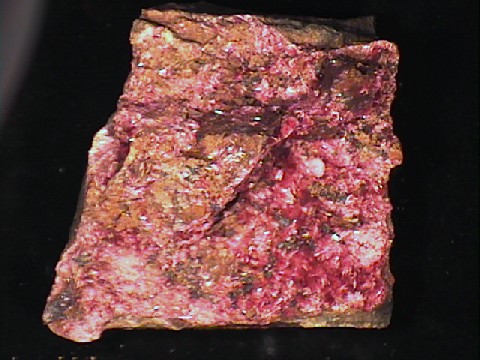
ERYTHRITE specimen ery-10
$ 125.00
$ 125.00
Dims: 2.64x2.56x2.32" (6.7x6.5x5.9cm)
Wt: 8.78oz (248.4g)
Mt. Cobalt, Queensland, Autralia
Erythrite nearly covers the host rock of this specimen. All of it is in the form of radiating acicular crystals with the characteristic purple-red color, but most of the crystals were growth-constrained, and look like simple crusts until examined with a loupe which reveals a mat of acicular crystals. In several protected areas, the erythrite forms spherical clusters of crystals, and the color appears significantly darker in these places, as you are seeing crystals head-on, instead of the side views that reflect more light. There are also a few areas where the erythrite appears to have formed a druze of rounded transparent crystals, with a slightly darker color and with a melted-wax luster, not unlike smithsonite. This may not be erythrite, although the color is the same, and I suspect it is just an unusual habit.
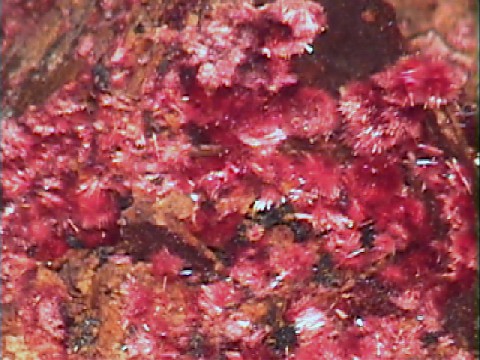

ery-10 ($125.00)
Mt. Cobalt, Queensland, Autralia
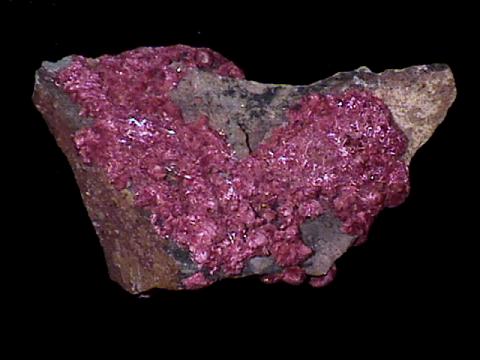
ERYTHRITE specimen ery-11
$ 63.00
$ 63.00
Dims: 3.23x1.98x0.98" (8.21x5.02x2.48cm)
Wt: 2.16oz. (61.1g)
Mt. Cobalt, Queensland, Autralia
Deep pink acicular crystals of erythrite cover most of one surface of this specimen. There are numerous dense radial sprays of the very fine needles, but most of the surface is a mat of intergrown crystals. This was a thin crevice that nearly filled with erythrite - the contact surface from the other side is clearly visible, and consists of a flat array of somewhat larger intergrown crystals. The larger crystals appear transparent, although they are still too small for me to be sure. Most of the outer balls show some damage, as the crystals are quite delicate, and any fine needles protruding beyond the dense core have broken away.
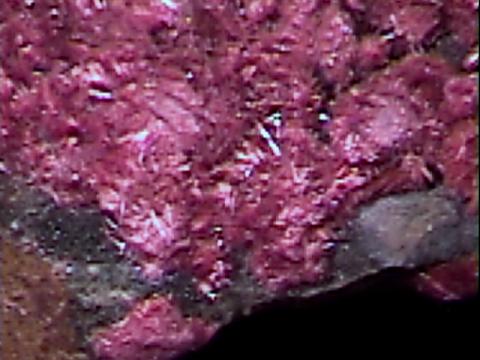

ery-11 ($ 63.00)
Mt. Cobalt, Queensland, Autralia
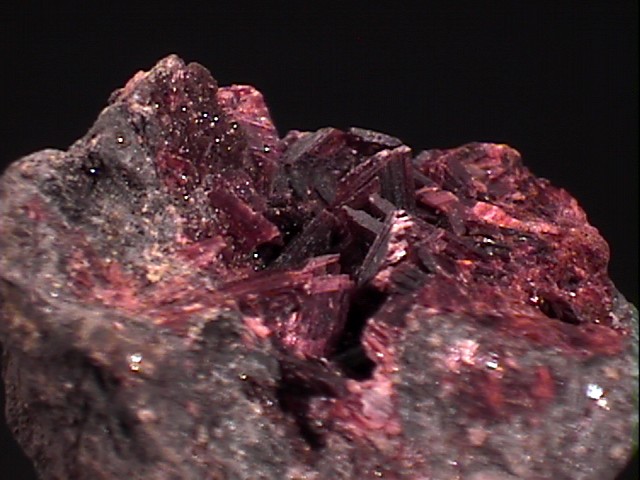
ERYTHRITE specimen ery-12
$ 25.00
$ 25.00
Dims: 1.67x1.41x1.32" (4.25x3.57x3.35cm)
Wt: 2.02oz (57.4g)
Bou Azzer, Morocco
Every surface of this speicmen shows at least some crystals of erythrite, as it apparently filled all of the cavities. The best crystals are confined to two opposite sides, where larger cavities were exposed that allowed good crystals to form. The best crystals have an excellent maroon color, are transparent, and have a vitreous luster. Many of the larger crystals, however, appear dulled by a thin coating of some dark iron-black mineral which looks like goethite under a loupe. The erythrite crystals are organized in clusters of flat blades with a parallelogram outline.
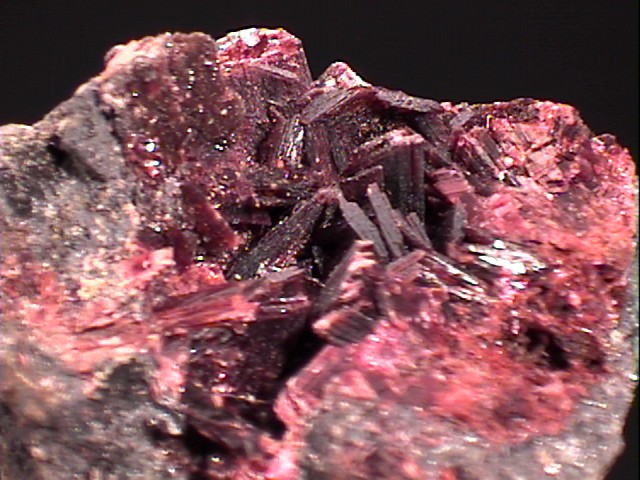

ery-12 ($ 25.00)
Bou Azzer, Morocco
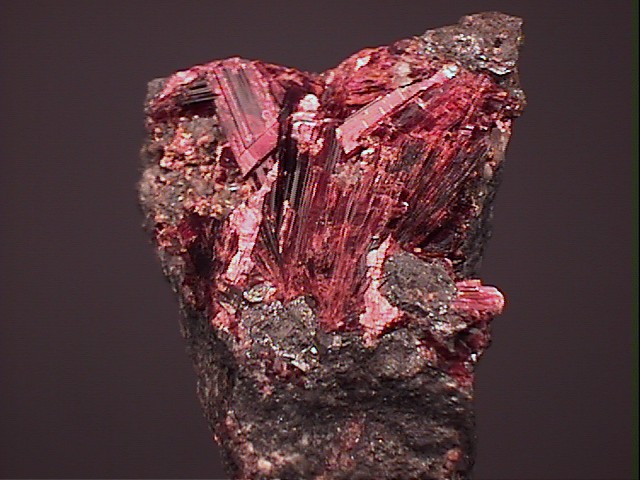
ERYTHRITE specimen ery-13
$ 35.00
$ 35.00
Dims: 1.43x0.98x0.78" (3.63x2.50x1.99cm)
Wt: 0.77oz (21.7g)
Morroco
Layers of flat, nearly tabular crystals of erythrite cover most of one side of this specimen. They have an excellent deep maroon color, are transparent and have a vitreous luster. To the unaided eye, there are two visible shades, a deeper maroon where the transparency penetrates the full crystal depth, and a lighter shade where internal cleavage fractures reflect light near the surface. A loupe reveals that a few small perfect crystals are present, while most of the crystals do show cleavage faces or damaged tips or edges where the specimen was removed from the earth. My loupe also shows a few tiny areas of radiating acicular balls of erythrite.
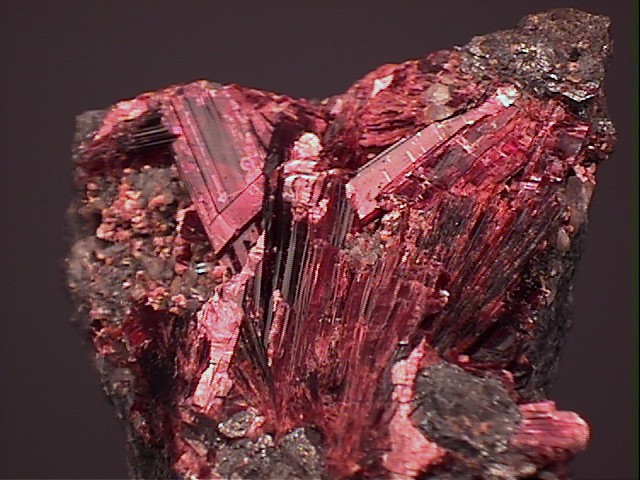

ery-13 ($ 35.00)
Morroco

ERYTHRITE specimen ery-14
$ 75.00
$ 75.00
Dims: 2.65x1.61x1.03in (6.73x4.10x2.63cm)
Wt: 3.25oz (92.0g)
Morocco
This specimen displays several sprays of deep maroon crystals of erythrite, one of which is nearly perfect with excellent terminations and transparent crystals. While most of the erythrite is exposed by fracture or cleavage, there are several pockets of perfect, tiny crystals.


ery-14 ($ 75.00)
Morocco

ERYTHRITE specimen ery-15
$ 45.00
$ 45.00
dims mm=52.34x48.92x30.61
wt g=74.5
Morocco
A crevice in the original host rock was nearly filled with crystals of erythrite and quartz. Where the erythrite had room to grow, the crystals are excellent with a deep maroon color, vitrous luster, and they are very transparent. The quartz crystals are milky white, long and prismatic although distorted.


ery-15 ($ 45.00)
Morocco